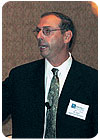
Megan White (L) and Dr. Leslie Pagliari.
The “Innovative Thinking” conference sponsored by BNP Media Co.'s Plumbing Group of magazines - SUPPLY HOUSE TIMES,Plumbing & Mechanical, andPM Engineer- at Lake Lanier Islands resort near Atlanta last June provided in-depth examination by experts on the topic “Hiring, Retention and Training.” Following are highlights from the conference.

Success With Hispanics/ Hispanic Labor
Ricardo González, founder and CEO of Bilingual America:
Women In Plumbing Panel
Ellen Rohr, a consultant and small business columnist with Plumbing & Mechanical magazine, as well as the former president of Benjamin Franklin Plumbing, moderated the panel.
“Stop thinking of women as women - think of them as professionals.”
Women plumbers show up on time; are clean and professional-looking; explain how the heating system works or how to shut off the water; and don't leave a mess in the customer's home.

Megan White (L) and Dr. Leslie Pagliari.
Recruiting And Training Young Workers
Megan White, director of organizational development at Castle Supply, Pinellas Park, FL:
Dr. Leslie Pagliari, assistant professor in the Technology Systems Department at Eastern Carolina University and program coordinator of the Distribution and Logistics Program at ECU:
http://www.ecu.edu/e3careers/forstudents.lookingforwork.salaryinfo.asp

WILLIAM RAYMOND, co-owner, Frank & Lindy Plumbing & Heating Service Co.:

MIKE MAYBERRY, president of HVAC Agent & Plumbing Agent:

JESSE ELLIOTT, an independent consultant:

STAFFING POWER!
AL LEVI, president, Appleseed Business:
